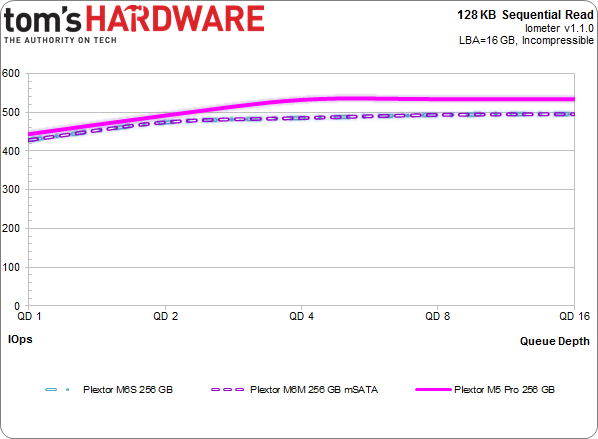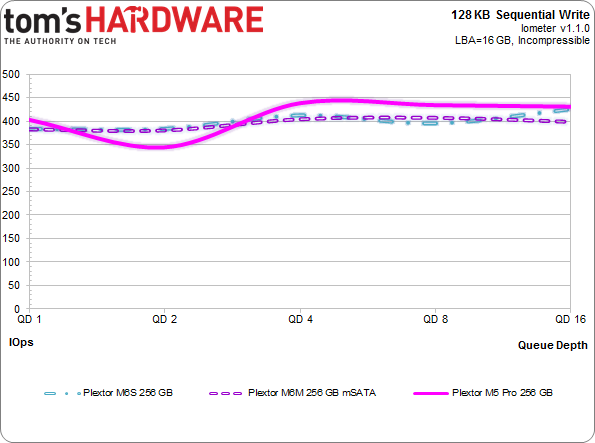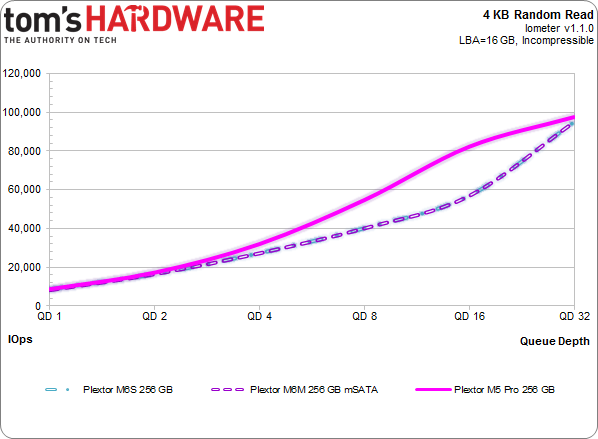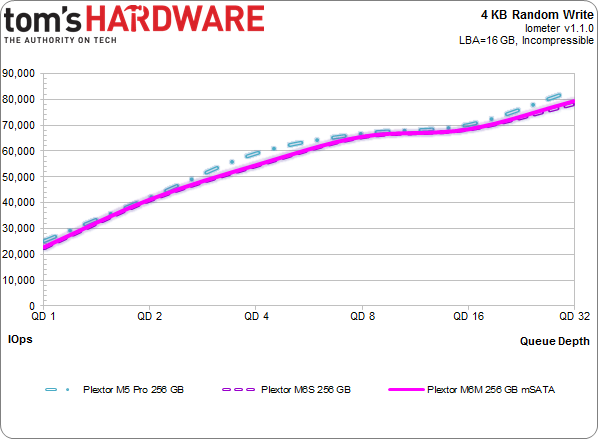Plextor M6S And M6M SSD Review: Revving Another Marvell Engine
Plextor is launching two new SSDs under its M6 banner. The M6S and M6M lean on Toshiba's A19 flash and Marvell's updated 9188 silicon. Together, both components (plus some custom firmware work) should augment value and speed in a couple of form factors.
Results: Random And Sequential Performance
Sequential Performance
Fantastic sequential read and write performance is a trademark of modern SSDs. To measure it, we use incompressible data over a 16 GB LBA space, and then test at queue depths from one to 16. We're reporting these numbers in binary (where 1 KB equals 1024 bytes) instead of decimal numbers (where 1 KB is 1000 bytes). When necessary, we also limit the scale of the chart to enhance readability.
128 KB Sequential Read
Plextor uses CrystalDiskMark to generate the 520 MB/s sequential read specification for its M6 drives. CDM uses neither 128 KB accesses nor reports in binary, so the 500 MB/s we see is more or less comparable. That's not as much throughput as the M5 Pro, however.
128 KB Sequential Write
The same applies to sequential writes, though the pair of M6es seems to do more with less. Using half as many dies, the new drives nip at the M5P's heels.
There are some gains from the controller and firmware, and changes to the flash. But that's enough to swamp the 256 GB Adata SP920 I just reviewed. Using the same number of dies and a similar controller, the SP920 only managed 344 MB/s. Despite similarities elsewhere, this illustrates Toshiba's A19 flash giving Micron's 128 Gb L85A NAND a run for its money.
Get Tom's Hardware's best news and in-depth reviews, straight to your inbox.
Random Performance
We turn to Iometer as our synthetic metric of choice for testing 4 KB random performance. Technically, "random" translates to a consecutive access that occurs more than one sector away. On a mechanical hard disk, this can lead to significant latencies that hammer performance. Spinning media simply handles sequential accesses much better than random ones, since the heads don't have to be physically repositioned. With SSDs, the random/sequential access distinction is much less relevant. Data are put wherever the controller wants it, so the idea that the operating system sees one piece of information next to another is mostly just an illusion.
Random 4 KB Reads
The pair of M6es fall behind in the middle of our chart, which you especially see with 16 outstanding commands. Both SSDs recover to hit Plextor's rating of 94,000 IOPS by the end, though. Its M5 Pro is 3000 IOPS-faster up top thanks to the Xtreme firmware, but all three drives start from the same 8000 IOPS-range at a queue depth of one. And that's what matters. Random reads on the desktop typically happen at low queue depths, and 9000 to 10,000 IOPS is as much as you can expect from incumbents like Samsung's 840 EVO. Plextor's drives are in good company down there.
Random 4 KB Writes
Plextor says its 256 GB models should hit 80,000 IOPS in a 4 KB random write test, and that's exactly what we record in Iometer. Again, the older M5 Pro delivers 3000 additional IOPS at a queue depth of 32. All three SSDs perform very similarly otherwise, though.
Current page: Results: Random And Sequential Performance
Prev Page How We're Testing Plextor's M6S And M6M Next Page Results: Tom's Hardware Storage Bench v1.0-
bjaminnyc I know there are slight performance differences between models and manufacturers, for the home user the discrepancies matter very little other than lifespan. It all comes down to price point for non-commercial application, not sure where this really fits in the product stack.Reply -
WithoutWeakness The Marvell 88SS9188 controller in the M6S is only capable of addressing 4 NAND channels at a time whereas the 88SS9187 (Crucial M500, Plextor M5Pro) and 88SS9189 (Crucial M550) are capable of addressing a full 8 channels. I would expect the Plextor M6Pro to use the newer 88SS9189 found in the M550 to be able to address 8 channels of NAND and support up to 1TB drives using 128Gbit NAND.Reply -
Ipatinga Clean looks... ok update for the M5S... here hopping M6P will have something on its sleeve performance wise. I liked the Plextor software (its like a bonus for some people... ).Reply
But I still have the Samsung 840 EVO on my list, after all, when the dust settles, they both perform very well in a notebook for a regular joe, but the EVO has the price to beat.
Since my Crucial m4 is not dead... I will wait... mainly for prices to go even lower so I can get a higher capacity model instead of the best of the best. -
cryan Reply13069953 said:The Marvell 88SS9188 controller in the M6S is only capable of addressing 4 NAND channels at a time whereas the 88SS9187 (Crucial M500, Plextor M5Pro) and 88SS9189 (Crucial M550) are capable of addressing a full 8 channels. I would expect the Plextor M6Pro to use the newer 88SS9189 found in the M550 to be able to address 8 channels of NAND and support up to 1TB drives using 128Gbit NAND.
So we weren't able to get confirmation from Plextor or Marvell, but it's probably the case that the 9188 is a cut down four channel version of the 9189. It's all the more annoying, because this is the third review in a row with new Marvell silicon but no actual info from Marvell.
We have a pretty good idea of this from looking at the 9174 4 channel used in the UltraPlus vs the 8 channel 9175 used in.... pretty much everything else ever made... that the 9188 is a four channel version of the 9189. But we don't know how many CEs per channel it has, or much else for that matter.
However, we do know Plextor's M6 Pro will have a 1 TB version, also with A19 flash. Plextor reps told me as much at the 2013 Flash Memory Summit. That was last August though, so I think there have been some delays -- either with Marvell, Toshiba, or both.
Regards,
Christopher Ryan -
cryan Reply13071551 said:Why not compare the Samsung EVO 840?
If you're referring to the 128 KB sequential and 4 KB random performance, I'm trying to keep those clean. I'd much rather throw down on matchups like this in more important metrics. However, with TRIM testing out this go around, the EVO v. M6 angle got downplayed. It's an oversight.
Regards,
Christopher Ryan
-
cryan Reply13073455 said:I really wish write speeds would actually make a jump.
For sequential writes, you can't do much better than 500 MB/s. The fastest M6M/M6S hits 440 MB/s, and so there just isn't much room left to grow unless you switch to PCIe-based storage or add a couple drives in RAID.
Regards,
Christopher Ryan
-
michaelrhaley Great article! I'd like to see a summary comparison of your top ten drives listed in Tom's best SSDs for the money using your new benchmark. Most important is your omission of Samsung 256G Pro which has been your leader for 8 months cited now as "face meltingly fast". Any performance benchmark must include the Samsung leader. Love to see this right away from you!Reply
Sincerely, Michael -
kalmquist Currently, the 128GB M6S is selling for $100 on Newegg, the 256GB M6S is selling for $165. The 512GB M6S is not listed.Reply
Hard to justify buying these over the Samsung 840 EVO ($85 and $154). Actually, for most uses my first thought would be the Crucial M500 ($75 and $120). The M500 doesn't win on either performance or power consumption, but it is good enough that these will not be major issues for the typical user.



